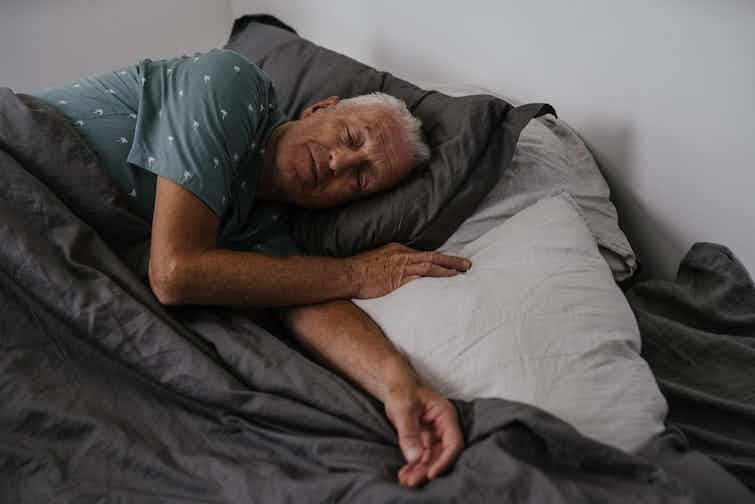If you’re having trouble sleeping, using melatonin supplements could help. However, it depends on the sleep condition you wish to treat - melatonin gummies don’t work for all sleep disturbances. And they’re not legally available in the UK without a prescription.
Before rushing out to buy a bottle of melatonin gummies — or any other sleep aid — online, chatting with your healthcare provider is a good idea. This will help you understand how melatonin and your natural sleep cycles work and what you can do to improve your sleep.
Getting a good night’s sleep
We all have a sleep and wake cycle known as a circadian rhythm. This natural 24-hour-ish cycle is influenced by our exposure to light and supported by a key sleep hormone — melatonin. Blackout curtains can help maintain your sleep cycle, particularly through summer, as they’ll stop natural light from disrupting sleep hormones.
The pineal gland in your brain naturally produces melatonin. Levels of this hormone begin increasing when natural light fades. It induces a state of gentle wakefulness in your mind and body. Although it doesn’t make you immediately drowsy, it does relax you and help with unwinding for sleep.
A regular and calming bedtime routine supports your natural circadian rhythms and melatonin production. Avoiding blue light from phones and other screens, keeping a regular bedtime and wake time, and exercising throughout the day (but no more than 2 hours before bed) all contribute to good quality sleep. Learn more about getting more deep sleep here.
But no one sleeps well every night. And some of us have more trouble sleeping than others. As we age, sleep can become more elusive. That’s because our melatonin production declines around the age of 55. It can also fluctuate throughout our lives for other reasons. This is when melatonin supplements like gummies may be helpful.
Is it legal to use melatonin sleep gummies in the UK?
In the UK, melatonin requires a prescription. That means you won’t find it in health food shops. The UK’s Medical and Healthcare Products Regulation Agency (MHRA) regards melatonin as “medical by function”, so a licence is needed to sell them. The upside is that melatonin sold in the UK is regulated and contains the advertised amount.
It’s legal to sell and take melatonin supplements in the UK; you just need to chat with your healthcare professional before trying them.
It’s a different story in the US. The Food and Drug Administration (FDA) treats melatonin as a dietary supplement, so it doesn't undergo the same regulations as other medications. Approval for aiding sleep problems or resetting sleep cycles disrupted by jet lag doesn't need specific melatonin quantities. As a result, sleep aids in the US can vary in their melatonin content, and some might not contain any at all.
What are the benefits and risks of sleep gummies?
The obvious benefit of gummies is the sleep support they provide. Dropping off to sleep faster and enjoying better sleep quality is why most people take them. People with insomnia, delayed sleep-wake phase disorder, and non-24-hour sleep-wake cycles benefit from taking 2mg of melatonin an hour or two before bed.
The recommended dose for treating jetlag-related sleep issues is slightly higher at 3mg a night for up to 5 nights. Along with supporting better sleep, gummies are a great tasting way to begin an evening wind-down routine.
Gummies come in a wide range of flavours. Supplements may contain citric acid and sodium citrate. These additives provide the orange and lemon or sour-salty flavours of gummies. Sleep gummies also frequently use pectin and gluten to thicken and add flavour. People with allergies should check the packaging and ingredients before taking them.
Although melatonin is produced naturally by our bodies, taking supplements containing it isn’t entirely risk-free. Some of the common side effects of melatonin gummies and supplements include:
- Headaches.
- Nausea and stomach aches.
- Feeling tired and drowsiness throughout the day.
- Dizziness, irritability and restlessness.
- Dry mouth and skin.
- Strange dreams and night sweats.
Breastfeeding women, children, people with autoimmune and seizure disorders, or people suffering from depression shouldn’t use melatonin supplements. People with medical conditions such as high blood pressure or diabetes should speak with their healthcare professional before taking melatonin gummies or similar products.
Supporting better sleep with melatonin gummies
Melatonin gummies don’t work for all sleep conditions. If you have sleep apnea, you should avoid taking melatonin. However, if you have insomnia, delayed sleep-wake phase disorder, jet lag, and other sleep conditions, you can use them to get your sleeping rhythms back on track.
Not all sleep gummies are created equal. Different brands have different ingredients; some include melatonin, while others may exclude melatonin and instead use l-theanine, CBD, chamomile extract, lavender or a combination of these as their active ingredients.
If you want to try melatonin to aid sleep, chat with your healthcare professional first. They’ll help you understand the type of sleep condition you are dealing with. After your consultation, you may be prescribed melatonin supplements in tablet, capsule, gummy or liquid form.
What are the active ingredients in sleep gummies?
Each brand of sleep supplement will have slightly different recipes for their chewable sleep treats. Most include melatonin, l-theanine, CBD, 5-htp, chamomile or a combination of these active ingredients.
What is melatonin and what does it do?
Melatonin is a natural sleep hormone produced by the pineal gland in your brain in response to waning light. The increasing melatonin levels in your body help you prepare for sleep. When melatonin peaks, you experience your deepest and most restful sleep. As levels reduce again, you move towards wakefulness.
Melatonin regulates your sleep-wake cycle as well as women’s menstrual cycles. It protects your brain from losing functioning neurons; some scientists believe it has anti-ageing properties. For supplements, manufacturers can extract melatonin from animals and microorganisms, but the most common method is synthetic production.
What is l-theanine and why is it used in sleep gummies?
Our bodies don’t produce this stress-relieving amino acid. Instead, you can find it in green tea leaves. Research has found it effectively relieves stress, improves mood and helps to maintain normal sleep patterns. This small study in 2019 also found an evening 200 mg dose of L-theanine reduced stress-related sleep problems, anxiety, and depression.
What is CBD?
CBD oil is extracted from the cannabis sativa or hemp plant. It’s not psychoactive, so it won’t give you a high, but it is known to have anti-anxiety effects that can improve sleep. It can be a useful sleep aid when combined with other ingredients to create sleep gummies.
What is 5-htp?
5-htp is a chemical the body makes from the amino acid tryptophan, which you can find in various foods. Our body uses 5-htp to make serotonin and melatonin. These hormones relax your mind and body to prepare you for sleep. Gummies with 5-htp will help you off to dreamland.
Chamomile for better sleep
Chamomile is an ancient medicinal herb. Traditionally, people have used it to help calm and soothe various conditions, including aiding individuals who struggle with sleep. It’s a mild sedative, and the extract reduces stress hormones, helping you relax.
Choosing the right sleep gummies
Not all sleep gummies contain melatonin, and you cannot resolve all sleep issues with melatonin supplements. If you’re having trouble sleeping or waking feeling unrested, you must speak with your healthcare professional before purchasing melatonin gummies online.
Although we produce melatonin naturally, not all sleep issues are related to the production of this sleep hormone. Understanding how to support a good night’s sleep will help you get better rest, even without a sleep aid.
Image Credit: SHVETS production at Pexels






